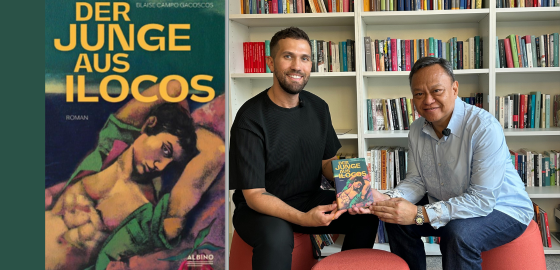"I think I have humanized the life and voice of Victor. And i think that's why he becomes empathetic to so many people."

© Albino Verlag; FBM
Filipino author Blaise Campo Gacoscos was born in Candon, Ilocos Sur, in 1968. His coming-of-age novel ‘The Boy from Ilocos’ (published in 2025 by Albino Verlag, translated into German by Andreas Diesel; original title: ‘Kites in the Night’ (2022, Ateneo de Manila University Press) is set in the Philippines and takes readers into the emotional world of Viktor, who grows up between tradition and transformation. The novel is a new German publication from the FBM Guest of Honour 2025, the Philippines. In our interview, Blaise talks about finding your own voice in queer literature and how to depict intimacy the ‘British way’.
Blaise, if you had to describe *Der Junge aus Ilocos* in just one sentence—something that makes people want to read it—what would you say?
Unique, I'd say that. Because say you have never read or heard about a book or literature from the philippines and the culture there: Then you have to read the book. Its a Filipino book.
Your novel paints such a vivid picture of rural life and family bonds in Ilocos. What moved you to tell Victor’s story in this specific setting?
This (the book) is based on my life. There are fragments of my life all over the novel. Of course it would be easier for to me to depict something in my hometowm city - Ilocos. I really planned to make a coming-of-age story. And I wouldn't know how to write a story about a different place. I was born in Icolos, so I know the place – i know everything there! And so maybe its also due to the convenience that the book takes place there - it just has to be my birthplace.
One of the most touching elements is the way you portray Victor’s emotional world. How did you approach writing young and also queer-coded intimacy without beig too explicit?
All of this is an understatement in the novel. It is very spare – and so I have to be very spare in my detailing. It's up to the reader to draw from it – what he wants to see. You have to tell it in a way where you dont go over it. And show just the right amount of detail. And I used control and restraint. Even with the dialogues and everything, it has to be very controlled. And, you have to learn how to edit it. So i learned to edit it the “British way”.
In your opinion, what role does queer literature play today, especially in Southeast Asia and how do you hope your book contributes to that space?
Any book about queer literature is important. Because the LGTBQ+ community has been marginalized and disenfranchised – so we have to speak and speak up! There has to be a voice, and this voice is coming out in many different countries in Southeast Asia, which is good. So we have to be united in telling our stories. And in my case, I tell this story as literature, it becomes gay literature but primarily this is literature. I think I have humanized the life and voice of Victor. And i think that's why he becomes empathetic to so many people and readers - and I think that's a good way to start.
Your chapters read almost like self-contained short stories. Was that a conscious structural decision—if so, what did you want to achieve with that format?
Yes, in the beginning, I wanted to do a collection of short stories. But my mentor said that this could be a novel and that I can use the short stories and write it as a composite novel. So i entertained the thought and it was quite difficult at first, because everything was already planned out as a collection of short stories and i had to change everything. For example, all the main characters who were women, turned into Victors point of view. And my worries were that it wasn't possible. But my mentor said it is possible and especially in a composite novel. You just need one character living from one chapter to the next. How long did the whole process of writing take? More or less 10 years! So, when you ask me for the next book, this is my answer. And you know, writing is a process – it means writing and writing and rewriting.
I met a young teacher from Ilocos – and he told me that he went to a bbookstore and bought my book for Pride Month. And he said that reading my book introduced him to his own literature. And maybe that's exactly what I want to happen. There is Philippine literature and so, if you are a Filipino, please read Filipino literature. And to the world: Same thing!
Blaise, thank you so much for sharing.
The interview is a cooperation with Marlon Brand (booksaregayasfuck) and was conducted by Tim Beißwenger and Lea Nordmann from the Frankfurter Buchmesse Team.
